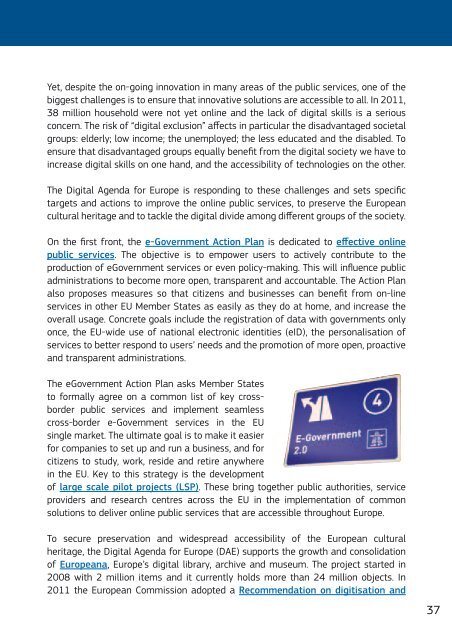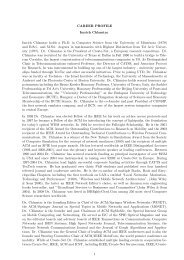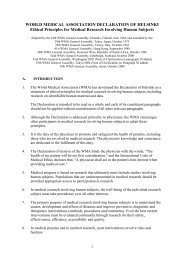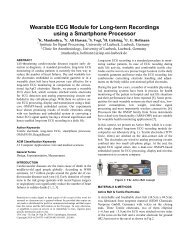ICT for Societal Challenges - European Commission - Europa
ICT for Societal Challenges - European Commission - Europa
ICT for Societal Challenges - European Commission - Europa
Create successful ePaper yourself
Turn your PDF publications into a flip-book with our unique Google optimized e-Paper software.
Yet, despite the on-going innovation in many areas of the public services, one of the<br />
biggest challenges is to ensure that innovative solutions are accessible to all. In 2011,<br />
38 million household were not yet online and the lack of digital skills is a serious<br />
concern. The risk of “digital exclusion” affects in particular the disadvantaged societal<br />
groups: elderly; low income; the unemployed; the less educated and the disabled. To<br />
ensure that disadvantaged groups equally benefit from the digital society we have to<br />
increase digital skills on one hand, and the accessibility of technologies on the other.<br />
The Digital Agenda <strong>for</strong> Europe is responding to these challenges and sets specific<br />
targets and actions to improve the online public services, to preserve the <strong>European</strong><br />
cultural heritage and to tackle the digital divide among different groups of the society.<br />
On the first front, the e-Government Action Plan is dedicated to effective online<br />
public services. The objective is to empower users to actively contribute to the<br />
production of eGovernment services or even policy-making. This will influence public<br />
administrations to become more open, transparent and accountable. The Action Plan<br />
also proposes measures so that citizens and businesses can benefit from on-line<br />
services in other EU Member States as easily as they do at home, and increase the<br />
overall usage. Concrete goals include the registration of data with governments only<br />
once, the EU-wide use of national electronic identities (eID), the personalisation of<br />
services to better respond to users’ needs and the promotion of more open, proactive<br />
and transparent administrations.<br />
The eGovernment Action Plan asks Member States<br />
to <strong>for</strong>mally agree on a common list of key crossborder<br />
public services and implement seamless<br />
cross-border e-Government services in the EU<br />
single market. The ultimate goal is to make it easier<br />
<strong>for</strong> companies to set up and run a business, and <strong>for</strong><br />
citizens to study, work, reside and retire anywhere<br />
in the EU. Key to this strategy is the development<br />
of large scale pilot projects (LSP). These bring together public authorities, service<br />
providers and research centres across the EU in the implementation of common<br />
solutions to deliver online public services that are accessible throughout Europe.<br />
To secure preservation and widespread accessibility of the <strong>European</strong> cultural<br />
heritage, the Digital Agenda <strong>for</strong> Europe (DAE) supports the growth and consolidation<br />
of <strong>European</strong>a, Europe’s digital library, archive and museum. The project started in<br />
2008 with 2 million items and it currently holds more than 24 million objects. In<br />
2011 the <strong>European</strong> <strong>Commission</strong> adopted a Recommendation on digitisation and<br />
37






